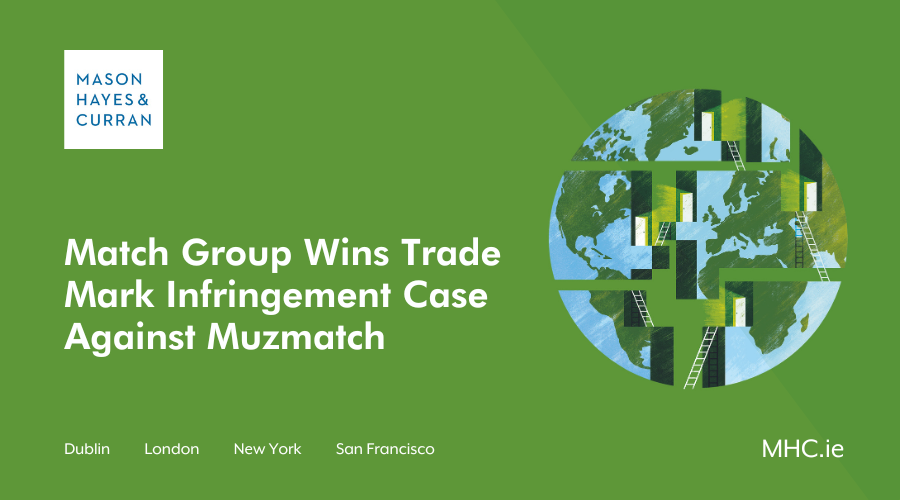Match Group Wins Trade Mark Infringement Case Against Muzmatch

A UK Court of Appeal has recently found in favour of Match Group, the owner of Tinder, OkCupid, Hinge and Plenty of Fish in a case involving infringement of its MATCH trade marks taken against a Muslim dating app called Muzmatch and its CEO. The Muzmatch app has now been forced to re-brand and has since changed its name to Muzz. Despite using the Muzmatch name since its launch in 2015 until proceedings were initiated by Match Group in 2020, Muzz failed in its efforts to rely on the defence of honest concurrent use of the MATCH mark. We analyse the decision and its impact for brand owners.
Background
Match Group launched its online dating services in the UK in 2001. It is the owner of two European Union Trade Marks (EUTMs) for the mark MATCH.COM and a UK trade mark registration for “match” in a lower case font together with a small heart device, as shown below.

Amongst other goods and services, the Match Group trade marks protect “Information and consultancy services in the nature and field of on-line dating and introduction services.” Muzmatch, as it was then named, is also an online dating service aimed at the Muslim community. Muzmatch launched online in 2011 and then via an app in 2015. As part of its marketing strategy, Muzmatch used 132 SEO keywords including for example:
- “match-muslim”
- “muslimmatch”
- “muslim-match”, and
- “UK-muslim-match”
Match Group became aware of Muzmatch’s activities in January 2016 but rather than taking immediate action, there followed a lengthy period of settlement negotiations and a period during which Match Group attempted on four separate occasions to acquire Muzmatch. When those offers were rejected by Muzmatch and negotiations later broke down, Match Group initiated proceedings for trade mark infringement in July 2020.
First Instance
In finding in favour of Match Group, the judge at first instance held that the average consumer would have viewed the word MATCH as the dominant element in Match Group’s trade marks and that there was a likelihood of confusion arising as a result of Muzmatch’s use of SEO keywords comprising the word “match.” The judge also held that the defence of honest concurrent use did not apply in the case as Muzmatch’s activities were always infringing. Muzmatch appealed to the Court of Appeal.
Court of Appeal
Lord Justice Arnold for the UK Court of Appeal upheld the first instance finding of infringement and passing off. On the question of honest concurrent use, the Court held that this is not a separate defence, but rather a factor in the infringement analysis. Lord Justice Arnold noted that once Match Group had established a case of trade mark infringement, the burden shifted to Muzmatch to establish that, by virtue of its honest concurrent use, there was no adverse effect on any of the functions of the MATCH trade marks. In differentiating the case from previous cases involving honest concurrent use such as BUDWEISER and IPC v Media 10, the UK Court of Appeal held that this was not a case where the length and scale of the concurrent use of the MATCH mark compelled the Court to infer that most consumers understood and had learned the difference between the two marks. Muzmatch’s appeal was therefore dismissed.
Key Takeaways
The Court of Appeal decision, which going forward will hold persuasive authority before Irish and EU Courts, is interesting in that it is not common for judgments to focus solely on the question of honest concurrent use. From a practical perspective, brand owners should take away the following key points from the decision:
- Once trade mark infringement is found, the burden then shifts to the defendant to establish how, due to honest concurrent use, there has been no adverse effect on any of the functions of the relevant trade mark.
- Honest concurrent use will only arise to rebut a claim for infringement or invalidity. In this case, due to the high level of similarity between the marks at issue, Muzmatch’s task in defending the infringement claim was never going to be easy. In order to avoid a similar situation arising, brand owners should always carry out trade mark clearance searches and seek professional advice before launching a new brand or in a new market.
- Only in exceptional cases will a claim for honest concurrent use be successful. In the BUDWEISER case for example, the parties had been concurrently using the BUDWEISER mark for almost 30 years. Similarly, in the IPC v Media 10 case, the parties had co-existed for around 92 years before proceedings were commenced. Clearly, each case will be heard on its own merits and much will turn on the individual facts.
- So far as the date of the assessment of honest concurrent use is concerned, the relevant date is the date when use of the sign complained of first commenced.
- Delay in bringing a claim should be avoided once rights holders are on notice of a potential infringement. Although the case represented a win for Match Group ultimately, Lord Justice Arnold was critical of the delay in pursuing the case as he surmised: “Like gardens trade mark cases always get worse with neglect – even if rights are not actually lost, delay is apt to turn what would be over in a few weeks by a quick application into a mini State trial.”
For more information on successfully protecting your organisation’s intellectual property rights, contact a member of our Intellectual Property team.
The content of this article is provided for information purposes only and does not constitute legal or other advice.
Share this:




